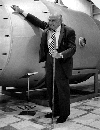Bombs, Science, and Love
Edward Teller's life and work changed life itself.

Edward Teller
History will remember him both as the father of the hydrogen bomb and as one of the most controversial physicists ever. Born in Hungary in 1908, Edward Teller worked with the greatest minds in his field, including Heisenberg, Bohr, and Fermi. But his hawkish stand on nuclear weapons and ferocious battles with political adversaries overshadowed nearly everything else he did. With his voluminous Memoirs due for publication this month, he spoke to us from his home in California.
Popular Science You became a physicist in the late 1920s. Have relationships among scientists changed over the years?
Edward Teller They have, and here is why: In the early days of quantum mechanics, there was a great deal of controversy. Much of it came down to the famous one between Bohr and Einstein, with Einstein saying he couldn’t believe God plays dice with the universe. You see, in 19th century physics, if you believed in God, you had to admit that God was unemployed. He created the universe and then left it up to the rules of science forever after. But today, using the same metaphor, you could say that if God exists, there is plenty for Him to do.
Modern quantum mechanics has led to the denial of absolute prediction of the future and leaves room for what we might call a freedom of choice, for God and for human beings. Our own actions might not be determinable by the molecules of our bodies and our brains. So the new science has answered many questions, but has opened other much more exciting, challenging questions. Consequently, relationships between scientists have become possessed of a new dimension.
PS What about the role of the
scientist in American society? Has that changed too?
ET Yes. During World War II and the Cold War, there was a definite role for scientists: to contribute to the defense of our country by inventing new weapons. Many said the only way to peace was to abstain from making them, but my conviction was that to create peace, you had to put weapons in the hands of those who wanted peace. And, fortunately, the United States has won the Cold War without bloodshed, simply because it had better weapons.
PS Why are so many Americans ignorant about science?
ET One problem is the press, which wants to make everything simple and surprising. The question is, how can the press better serve the common good in the development of science? I have no definite answer, except that the writer’s love of science must come through, and must reflect the challenging fact that the future is unpredictable. One must write, not only in defense of truth, but with love. Because science needs love, and plenty of it.